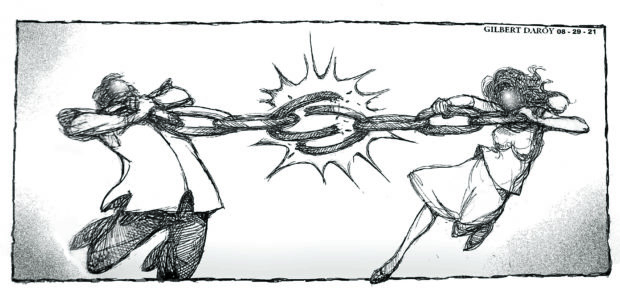Give the unhappily married a choice

Russian novelist Leo Tolstoy opens his novel “Anna Karenina” with these words: “Happy families are all alike, every unhappy family is unhappy in its own way.”
Couples in a happy marriage only rarely need to question the quality of their relationship, seeing in other satisfied and fulfilled unions around them a validation for their choices and commitment.
But as Tolstoy points out, unhappy families are each unique in their misery, each flawed and broken union displaying markers for failure, including incompatibility, dishonesty, infidelity and, yes, violence.
This is the reason the latest bill on absolute divorce, which was recently passed at the House of Representatives committee level and will soon be deliberated in plenary, is most relevant for Filipino citizens “caught in a bad romance,” as Lady Gaga would put it. Individuals who are happy with their life partners need not bestir themselves at the advance of a proposed divorce law. The existence of legal divorce in the country will not drive one or both spouses out of a successful marriage, nor will it suddenly curdle a loving relationship into one of loathing. Unless, that is, one or both are deluding themselves about the real state of their union.
Currently, the Philippines is only one of two states in the world (the other is the Vatican) where there is no legal divorce. What we have instead as a form of legal relief for those suffering failed marriages is a mixed bag of legal separation, annulment, and nullification of marriage in court and in Church tribunals — costly procedures often beyond the means of poor citizens — along with plain abandonment, desertion, and simply having the missing spouse declared dead.
The grounds for the legal remedies, said Albay Rep. Edcel Lagman, principal author of the measure, will be included among the grounds for absolute divorce. Other grounds included in the bill are separation in fact for at least five years at the time the petition is filed; when one of the spouses undergoes gender reassignment surgery or is transitioning into another sexual orientation; irreconcilable marital differences; domestic or marital abuse; and a valid foreign divorce secured by either the alien or Filipino spouse.
For Lagman, it’s primarily about the liberation of women caught in the vice of marital violence and abuse. The passage of the bill by the committee, said the Albay representative, is a “momentous occasion for countless wives, who are battered and deserted, to regain their humanity, self-respect and freedom from irredeemably failed marriages and utterly dysfunctional unions.”
But for Cibac (Citizens’ Battle Against Corruption) party list Rep. Eddie Villanueva, who is a House deputy speaker and a Protestant preacher, a divorce law is “inherently unconstitutional and contrary to the deeply-held Filipino value of preserving and fighting for marriage.” It is also, he railed, “against the will of God,” and would be “inviting wrath to this nation. Simply, the risks and dangers far outweigh the perceived benefits of this measure.”
Well, maybe Filipinos are no longer so much scared of the wrath of God as they are of stewing in silence and suffering in an untenable marriage. A 2014 survey by Social Weather Stations already found that some 60 percent of respondents said they support the legalization of divorce, while 29 percent were opposed and 11 percent were undecided. “Just as telling,” noted a July 2016 editorial in this paper, “is the 2011 report by the Catholic Bishops’ Conference of the Philippines’ CBCPNews, which quoted the [Office of the Solicitor General] as saying that the number of marriage annulment cases in the country had risen by 40 percent in the last decade, with at least 22 cases filed daily.”
Data from the same report showed that 82 percent of those who filed these cases had children—59 percent had at least one or two children, 22 percent had three to four children, and 1 percent had five to six children. What it indicated, as the editorial pointed out, was that children, “often cited as the glue that kept a couple together despite the cracks in the marriage, are no longer deterrents to the dissolution of a marital union.”
Divorce may, at the very least, free children from the toxicity that floats around a home where hostility reigns—that is, provided both exes find the magnanimity to set aside their differences and provide the children some balance and reassurance that the divorce was not their fault.
It’s been a long, torturous road that the mere idea of divorce has had to tread in this country. The still powerful influence of the Church and conservative forces may yet derail again or dilute the proposed law. But Filipinos are coming around to the idea that legal relief is owed those who are imprisoned in marriages beyond redemption. That greater sense of openness and empathy can only be a good thing.




















